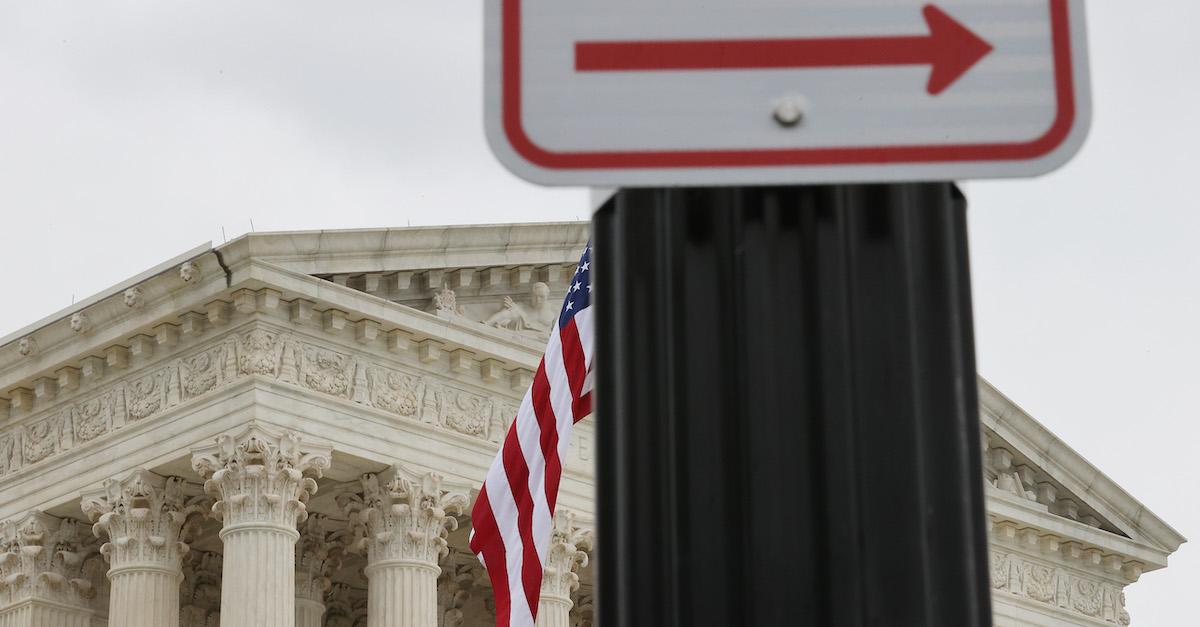
The U.S. Supreme Court should take up the issues of fetal personhood and prenatal rights, a group of anti-abortion activists said Tuesday, arguing a years-old Rhode Island ruling denying the unborn standing to sue should be vacated in light of the landmark Dobbs decision.
In their 46-page petition for writ of certiorari, the movants are attempting to have the nation’s high court “clarify whether an unborn human being has standing to access the courts” after losing legal battles in Rhode Island courts over several years dating back to 2019.
Catholics for Life, Inc., Nichole Leigh Rowley, and two unborn children now argue that their latest loss before the Rhode Island Supreme Court, which came in May of this year, should be reconsidered because that recent standing denial was “deeply rooted in Roe.”
Late the very next month, the conservative majority on the court decided that Roe v. Wade was no longer the law of the land.
The petitioners’ case relies, perforce, on the Dobbs ruling and its language that “Roe was egregiously wrong from the start,” while simultaneously treading lightly and insisting that their efforts “do not require” the justices “to adopt any particular ‘theory of life.'”
Their precise legal argument relies upon the historical parry-and-thrust-like efforts of the Rhode Island state legislature to criminalize abortion both before and after Roe and modern day efforts to codify a woman’s right to have an abortion into state law.
In 1973, weeks after the abortion rights ruling came down from the Burger Court, a Rhode Island federal court invalidated the Plantation State’s prior statute that criminalized almost all abortions as well as most efforts to help women obtain abortions. The legislature responded by enacting another criminal-abortion statute the next month. Two months later, the federal district court again invalidated the statute, as facially unconstitutional. Efforts by legislative forces of reaction to ban abortion, in some form or another, were essayed twice more in Rhode Island, in 1975 and 1997. Federal district and appellate courts would go on to strike those laws down each time.
In 2019, Rhode Island passed the Reproductive Privacy Act, which generally codified the right to an abortion under the Roe standards, and which formally repealed other anti-abortion statutes.
The petitioners (and others who later dropped out of the litigation) first sought to stop the law from taking effect. They lost their request for an injunction and then amended their complaint to challenge the legislature’s authority to enact the pro-abortion law and to obtain a declaration of their rights which they claimed were lost when the RPA was enacted. The state filed for a dismissal, which it received, and the petitioners have been appealing (and losing) up the legal ladder since.
“Viewing the allegations in their pleadings in the light most favorable to the adult plaintiffs, we are of the opinion that they lack standing to bring this action under any conceivable set of facts,” the Rhode Island Supreme Court said earlier this year. “[T]he unborn plaintiffs fail to assert a legally cognizable and protected interest as persons pursuant to these repealed statutes, which are contrary to the United States Constitution as construed by the United States Supreme Court.”
But, the anti-abortion litigants argue, there’s quite a difference that a month or so makes.
“In rejecting Petitioners’ claims of Fourteenth Amendment due process and equal protection guarantees, the Rhode Island Supreme Court based their decision to affirm dismissal of Petitioners’ case on Roe and Casey,” the petition notes – citing the 1992 case that affirmed the heart of Roe. “Dobbs overruled Roe and Casey. This Court should grant the writ to hold that, in light of Dobbs, the Rhode Island Supreme Court erred in its wholesale denial of Petitioners’ petition for reargument, and its affirming the trial court’s dismissal of Petitioners’ claims to the due process and equal protection clauses’ guarantees under the Fourteenth Amendment.”
The brief goes on to argue that legal protections for unborn human beings are “objectively deeply rooted” in the history and tradition of the country, dating back to the common law, including extant medical malpractice tort law, estate law, and wrongful death laws. And such rights were, nearly 150 years ago, availed by the Supreme Court itself.
Notably, the filing also argues that several of those alleged rights also explicitly existed in Rhode Island and, in the context of abortion, were only recently extinguished by the passage of the RPA.
This is an important argument for the petitioners and the discrete point it makes is repeated here at length:
[T]he RPA has no severability clause. Therefore, if any part of the RPA fails judicial scrutiny, the whole RPA fails. And, Baby Mary Doe and Baby Roe’s, “personhood” is revived, entitling them to the full protection and guarantees of the Fourteenth Amendment of the United States Constitution – and its reciprocal provision in the Rhode Island Constitution. The concomitant result therefore is that each qualifies as “any person” under federal and state law, who may not be deprived of “life” without due process nor the guarantees of equal protection under law.
Essentially, the argument goes, the RPA is unconstitutional because it extinguished “rights” for the two unborn children here that were previously still codified in Rhode Island in 2019 and because, as applied to them, the statute fails, so the entire statute fails, leaving the door open for the two yet-to-be-born children to claim rights under the 14th Amendment.
“This Court should grant the writ because, in light of Dobbs, the Rhode Island Supreme Court erred in holding that Petitioners, Baby Roe and Baby Mary Doe, were categorically not ‘any person’ recognized under the Fourteenth Amendment.” the filing sums up. “In the absence of an explicit textual definition of the words ‘any person’ in the Fourteenth Amendment, this Court should grant the writ in order to establish its meaning and scope relative to abortion laws.”
[image via Chip Somodevilla/Getty Images]